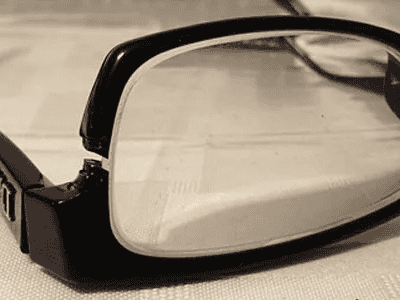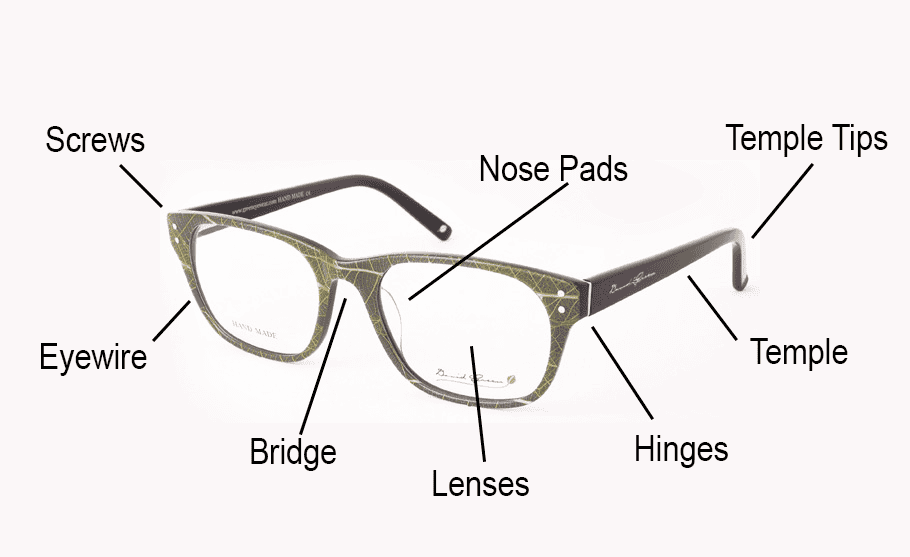What Should I Do Immediately After My Glasses Break?
When your eyeglasses break, especially if they are expensive, collectible, or limited edition frames, the first step should be to contact the store where you purchased them or reach out directly to the manufacturer. There’s a chance your glasses may still be under warranty, and professional assistance will ensure they are properly cared for. Attempting DIY repairs on such valuable frames can lead to further damage. However, if you need a temporary repair solution, we’ll take you through some DIY repair options to help you manage until you can take your glasses to an optician for a proper fix.
Before attempting any adjustments or repairs, it’s important to understand the basic structure of your eyeglasses. The main components include the lenses, eyewire, bridge, rims, screws, nose pads, temples (or arms), and temple tips.
Can I Fix My Glasses Myself?
In some cases using some basic tools and your hands, you can temporarily fix or adjust your glasses at home. If nothing else these quick fixes might get you by until you can see an optician or get a new pair.
If your glasses are missing a screw you have a few options:
First check to see if you have a glasses repair kit. These typically include a few different sized replacement screws and a small screwdriver. Check to see if any of these will fit your glasses and you’ll have a temporary fix. If you find a screw that fits your glasses but is too long, it’s important to NOT try and snap off the excess, attempting to do so can scratch your lenses or cause further damage to your frames.
An alternate quick fix is to take a toothpick and feed it as far into the screw hole as possible. Once it’s as secure as you can get it, simply break off the excess toothpick, this is by far the most temporary option and risks falling out at any time.
If you don’t have a glasses repair kit but want something a bit more reliable than a toothpick, check to see if you have some metal wire laying around. You can feed this wire through the screw hole, bend it around and twist it together like a twist tie, creating a slightly sturdier fix. You’ll want to make sure to cut off any excess and check to make sure the wire isn’t sharp before wearing your glasses again.
Under no circumstances should you EVER put super glue or another adhesive on your frames, regardless of what you’re fixing. Adhesives can permanently mess up your frames and in some cases make them completely irreparable.
For bent metal frames:
If you have a bent metal frame, you can typically very carefully bend it back into place. If you attempt to do this, know that your glasses may not sit on your face the same. This can cause discomfort, or in the case of stronger prescriptions mean missaligned lenses, meaning poorer vision.
The first thing you can try is carefully bending your frames back to how they used to be. Make sure you don’t hold your glasses by the lenses and be conscious of your nails, the last thing you want is to scratch your lenses.
If your frames aren’t quite bending back right, or are proving to be tough, the next thing to try is using a pair of soft tipped pliers if you have them. Regular pliers wrapped in a cloth of some type will suffice. Just about any cloth will work as this is just to keep the pliers from scratching your frames. Carefully attempt to bend your frames back into shape, once again taking care to not scratch your lenses or make the bend worse.
Once you’ve managed to get your frames into a wearable state, you’ll eventually want to go see a local optician to properly get your frames adjusted. This doesn’t have to happen immediately, but it is something to consider. While your glasses may feel right again, they may be sitting on your face crooked, or the optical center (part of the lens where you can see the clearest) might not be lined up correctly with your pupils providing you with suboptimal vision.
For bent acetate frames:
Take your bent frames and try running them under some hot water for a little bit. The heat from the water can soften the material and make it more malleable. Once your frames have warmed up, VERY carefully attempt to bend them, be extra gentle as the last thing you want is to snap your frames.
If the above method didn’t work, you can attempt the same exact thing, except this time try it with a hair dryer instead of warm water. Once more remember to be extra careful when attempting to bend your frames, and be conscious of how you hold them to avoid damaging your lenses
If you’re unable to bend your frames back properly with either of these techniques, you can go see a local optician, as they will have the proper tools to safely and properly readjust your frames.
For frames with snapped temples:
While not an ideal or attractive solution by any means, a bit of tape can work as a temporary fix until you can get a new pair of glasses. Take your broken temples and line them up as closely as you can, then take your tape and wrap them together as tight as you can. You may have to try and repeat this a few times before you can get your frames to sit on your face again.
For frames with a snapped eyewire:
If you have acetate or plastic frames that have snapped on the eyewire (the part of the frame that surrounds your lens), a temporary fix is possible with two-part epoxy. Below is a helpful step-by-step video guide, be extra careful if you attempt this to not get any epoxy on your lenses. If you don’t have epoxy on hand you’ll best be served by visiting a local optician to get your glasses fixed.
How Do I Find a Reliable Glasses Repair Service?
When professional repairs are needed, start by checking if the retailer from whom you bought your glasses offers repair services. Many opticians and eyewear stores provide repairs, sometimes even for free. You can also look for a local eyewear boutique for higher end service.
What Are My Options If My Glasses Are Beyond Repair?
If your glasses are beyond repair, (broken, cracked or scratched lenses, or severe frame damage) you will need to consider purchasing a new pair. Many optometrists and optical shops can expedite orders for those who need their glasses urgently. Though you’ll need an up-to-date prescription. Always keep a copy of your latest prescription for such emergencies.
You can also try looking for a local optical business that offers in-office finishing, meaning they have the tools to cut new lenses and possibly get your glasses back to you same day. The alternative means having to send your glasses to a lab which can sometimes take more than a week.
How Can I Prevent My Glasses From Breaking?
The most effective way to protect your glasses is by always storing them in a hard case when not in use. Avoid leaving them in places where they can be easily knocked off or sat upon. Never set your glasses down on the lenses as this can scratch them, and remember to periodically tighten the screws on your frames.
Discover independent eyewear with Project Spex. Every Friday, we deliver the latest in collectible eyewear and your favorite independent designers.
Sign up now and never miss a thing!
About The Author:

Will Benjamin is an advocate for independent eyewear and one of the driving forces behind Project Spex. With a passion for unique, collectible, and limited-edition eyewear, Will aims to inspire people to build their own collections through Project Spex, while supporting the success of independent opticals.



